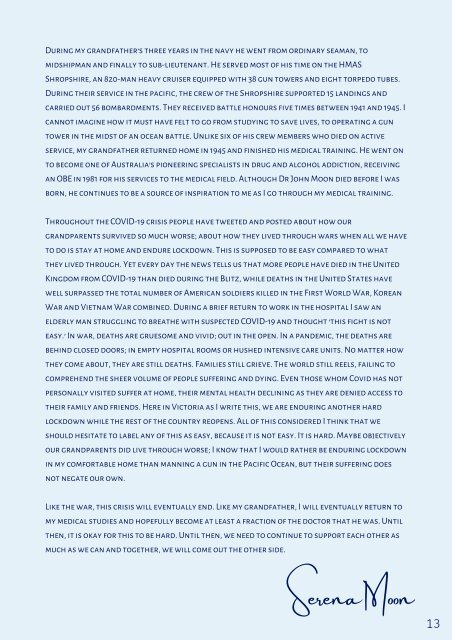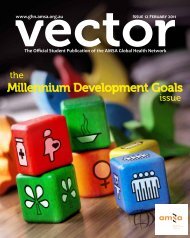PANACEA 2020
panacea /ˌpanəˈsiːə/ noun a solution or remedy for all difficulties or diseases. The term ‘Panacea’ embodies humanity’s unfaltering idealism, our wishful thinking and our unattainable dreams. It is this idealism which lays the foundation for our ambition and perseverance in the face of unparalleled hardship, and which fuels our resilience after defeat. In a time like the present and indeed throughout history, the concept of a ‘Panacea’ has been a frank deviation from reality – it is nothing more than a fantasy or escape. Nonetheless, for us, ‘Panacea’ is a delight, a source of hope and a symbol of our unending optimism. This year, the theme of AMSA’s student magazine, Panacea, is “When the dust settles: Reflection and renewal in a COVID-19 world.” We asked medical students from across Australia to submit written pieces or artwork relevant to the theme, for publication in a colourful and engaging digital magazine. Please enjoy the compilation of these wonderful works in Panacea 2020.
panacea
/ˌpanəˈsiːə/
noun
a solution or remedy for all difficulties or diseases.
The term ‘Panacea’ embodies humanity’s unfaltering idealism, our wishful thinking and our unattainable dreams. It is this idealism which lays the foundation for our ambition and perseverance in the face of unparalleled hardship, and which fuels our resilience after defeat. In a time like the present and indeed throughout history, the concept of a ‘Panacea’ has been a frank deviation from reality – it is nothing more than a fantasy or escape. Nonetheless, for us, ‘Panacea’ is a delight, a source of hope and a symbol of our unending optimism.
This year, the theme of AMSA’s student magazine, Panacea, is “When the dust settles: Reflection and renewal in a COVID-19 world.” We asked medical students from across Australia to submit written pieces or artwork relevant to the theme, for publication in a colourful and engaging digital magazine. Please enjoy the compilation of these wonderful works in Panacea 2020.
You also want an ePaper? Increase the reach of your titles
YUMPU automatically turns print PDFs into web optimized ePapers that Google loves.
During my grandfather’s three years in the navy he went from ordinary seaman, to<br />
midshipman and finally to sub-lieutenant. He served most of his time on the HMAS<br />
Shropshire, an 820-man heavy cruiser equipped with 38 gun towers and eight torpedo tubes.<br />
During their service in the pacific, the crew of the Shropshire supported 15 landings and<br />
carried out 56 bombardments. They received battle honours five times between 1941 and 1945. I<br />
cannot imagine how it must have felt to go from studying to save lives, to operating a gun<br />
tower in the midst of an ocean battle. Unlike six of his crew members who died on active<br />
service, my grandfather returned home in 1945 and finished his medical training. He went on<br />
to become one of Australia’s pioneering specialists in drug and alcohol addiction, receiving<br />
an OBE in 1981 for his services to the medical field. Although Dr John Moon died before I was<br />
born, he continues to be a source of inspiration to me as I go through my medical training.<br />
Throughout the COVID-19 crisis people have tweeted and posted about how our<br />
grandparents survived so much worse; about how they lived through wars when all we have<br />
to do is stay at home and endure lockdown. This is supposed to be easy compared to what<br />
they lived through. Yet every day the news tells us that more people have died in the United<br />
Kingdom from COVID-19 than died during the Blitz, while deaths in the United States have<br />
well surpassed the total number of American soldiers killed in the First World War, Korean<br />
War and Vietnam War combined. During a brief return to work in the hospital I saw an<br />
elderly man struggling to breathe with suspected COVID-19 and thought ‘this fight is not<br />
easy.’ In war, deaths are gruesome and vivid; out in the open. In a pandemic, the deaths are<br />
behind closed doors; in empty hospital rooms or hushed intensive care units. No matter how<br />
they come about, they are still deaths. Families still grieve. The world still reels, failing to<br />
comprehend the sheer volume of people suffering and dying. Even those whom Covid has not<br />
personally visited suffer at home, their mental health declining as they are denied access to<br />
their family and friends. Here in Victoria as I write this, we are enduring another hard<br />
lockdown while the rest of the country reopens. All of this considered I think that we<br />
should hesitate to label any of this as easy, because it is not easy. It is hard. Maybe objectively<br />
our grandparents did live through worse; I know that I would rather be enduring lockdown<br />
in my comfortable home than manning a gun in the Pacific Ocean, but their suffering does<br />
not negate our own.<br />
Like the war, this crisis will eventually end. Like my grandfather, I will eventually return to<br />
my medical studies and hopefully become at least a fraction of the doctor that he was. Until<br />
then, it is okay for this to be hard. Until then, we need to continue to support each other as<br />
much as we can and together, we will come out the other side.<br />
Serena Moon<br />
13

















